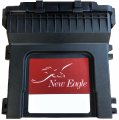BCM48
Overview
The BCM-5646-48-1404 functions as a communications gateway controller or general-purpose automotive grade rugged controller. It uniquely has four CAN, four LIN and embedded Ethernet as well as discrete IO. With an IP67 rating, the BCM-5646-48-1404 is able to withstand rough automotive, marine, and off-road environments. This device is Raptor programmable.
Features include:
- Freescale MPC 5646 microprocessor
- Operating Voltage: 9-16VDC
- Operating Temperature: -40°C to 85°C
- 4 CAN/4 LIN Channels/Ethernet
- IP67 rated
BCM48 Additional Info
BCM48 Compiler Options
Special Edition: CodeWarrior for MPC55xx/MPC56xx v2.10 (Classic) must be used to compile software for the BCM48. This compiler can be purchased from Freescale directly here.
Note: As of 2/1/2018 the v2.10 Classic Compiler needed for this module is the 4th one down in the list. Please press the more option to expand the download links.
Still having issues? Use the direct link below!
Direct Link: CodeWarrior for MPC55xx/MPC56xx v2.10 (Classic)- Updated 9/4/2018
Datasheet
- BCM-5646-48-1404
CAN vs. Ethernet
Application
- CAN
- Small scale
- Great for embedded systems
- ECUs in vehicles are a great example of effective CAN usage
- Ethernet
- Large scale
- Perfect for automation and control of fabrication
- Connecting, controlling and monitoring all the machines within a factory is a great application for Ethernet
Cost
- CAN
- Low cost
- Small amount of software and hardware required
- With the small scale applications, CAN is a convenient option
- Ethernet
- Cost effective
- With ever decreasing costs Ethernet is a feasible option for large scale operations
- With the large amount of hardware and software required, which leads to unlimited custom options
Specifications
- CAN
- 1 Mbit/sec data transfer rate
- Useful integrated functions such as:
- Message collision prevention
- Error detection
- Data recovery
- Ethernet
- Up to 100 times faster than CAN communication
- With the software addons excessively available anything can be added, such as:
- Incorporated prioritization
- Data synchronization
- Error management
Recovery Procedure
- 1. Select CAN 1 and set the baud rate to 500k.
- 2. Turn the power to module off, leave WAKE_INPUT1 connected.
- 3. Click on “Flash”. The window will say “No Modules Found”.
- 4. Click on “Recover”. Select “BCM48”.
- 5. Press “Go” in the pop-up window.
- 6. Power the module on.
- 7. Exit out of the pop-up window while the broadcast recovery message is still being sent.
- 8. Raptor-Cal will detect an Unidentified UDS Module. If this is not the case, go back to step 2.
- 9. Double-click the detected module. Do not flash yet.
- 10. Wait until Broadcast signal from Raptor-Cal is done being sent. You can see this when the Bus traffic bar is at 0%.
- 11. Flash the desired .rpg.
Frequently Asked Questions (FAQ)
Q: How much current does the module sink when hibernating? How much does it sink when not hibernating?
A: When WAKE_INPUT1 is low (module is hibernating), the module draws less than 1mA. When WAKE_INPUT1 is high (module is on), it draws about 76mA.
Q: What protocol does Raptor support on BCM48
A: UDP and TCP is available on Raptor 2018A and beyond
Q: What is the hardware specification for Ethernet channel
A: 10/100Mbps Auto-MDIX, Half/Full Duplex

